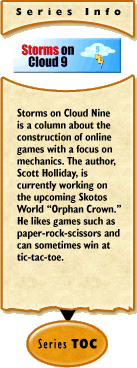
Death and Taxesby Scott Holliday I've spent some time considering the problem of real-cash to virtual-good exchanges. Clearly, this is going to be one of the biggest issues in online games for some time to come. I'm not going to argue one way or the other. In some cases, it may be beneficial to the game in question. In others, probably not. We've seen in recent history several different games fighting the second-markets with varying degrees of success. Some struggled fiercely, even banning some of their players. But their secondary-markets are still thriving. Others, such as EQ2 decided to take the line "if you can't beat 'em, join em." My guess is that this will crush the secondary-markets, but at the cost of becoming one yourself. Since my articles' theme is game design philosophy / mechanics, I wanted to present an alternate attack, by using the mechanics themselves to combat out-of-game exchanges. I've called it "InvisiTax", but you can really call it whatever you like. I'm sure there is a better name out there somewhere. I've seen similar systems in MUDs and MOOs, probably ten years ago, that were designed to prevent twinking. It worked there. Whether it would be able to defend against the "unstoppable power" of perceived-value economics, I don't really know. However, combined with other efforts, it certainly couldn't hurt. Introduction:
The process is designed to discourage unequal trading by placing a tax on unequal trades. In effect, when an unequal trade occurs, the system destroys some of the value that is traded. Regardless of the method used to move virtual goods (trading, drop and pick-up, PVP loot), the system could be configured to warn each party (if active) how much value is due for destruction. Obviously, trading with yourself is not taxed. For this reason, items dropped will need "owner" tags so that the owner can pick them up again with penalization. To especially target out-of-game trades, the process is geared to put higher penalties on trades that transfer large amounts of wealth unequally. As shown in the formula below, the more wealth that changes hands, the greater percentage of wealth is destroyed. By this method, equal exchanges are untaxed. However, unfair trades (such as an Ebay delivery) will lose a large portion of their value. This may encourage second-markets to trade in multiple small packets. However, this will naturally throw warning flags. Why did Player1 drop 100 packets of 10 gold all picked up by Player2? Furthermore, this would be an annoyance to both the seller and buyer. Especially if there was a time delay after making multiple drops in a short period of time. If the process itself becomes annoying to both parties, the "true value" in the exchange is further reduced. Formula:
Examples:
Added / Unintended Effects:
"Twinking" characters becomes difficult. Since some players enjoy being generous, this may discourage them, except for small donations. However, many players dislike the economic effects caused by twinking, so I would consider this effect an added plus. The system will need to maintain data on the average market prices for items. Otherwise, it will be unable to guess how much something is worth. In any case, since the system only destroys value, it can not be exploited in reverse. To reduce item value when selling at a discount, the item could be damaged, or could be shown with a reduced stack size. If neither of these options are available, perhaps the item could be substituted for a similar item of lesser value. Just because an item is offered does not mean it is taken. For instance, a character examining a box may find 30 different items left there. Although he will see the values after InvisiTax (of the total), the values of individual items won't change until he picks something up. Certain exchanges (such as donations to one's guild) who'd have to be carefully looked at. Perhaps money given to the guild may only be used for guild-level purchases. Guildhalls. NPC servants. Guild-level items. In this manner, you can avoid InvisiTax while giving to the guild. But, the guild may not give to individuals without invoking InvisiTax. [ <— #41: Archives and Information | #43: Traffic and Pipes —> ] |
